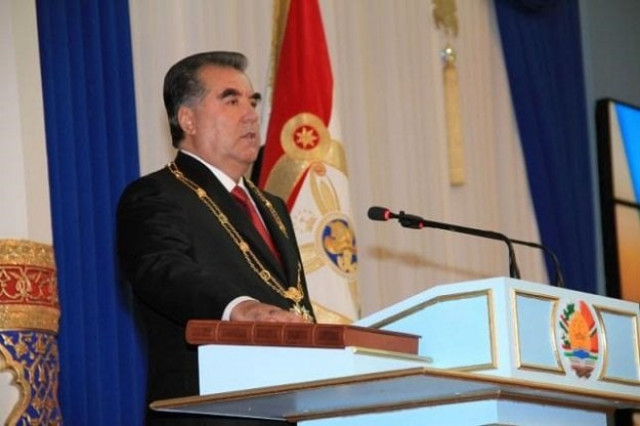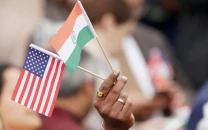Tajikistan in shock after mothers kill themselves and their babies
The country has been clobbered by the economic crisis sweeping through Central Asia

Tajikistan's President Imomali Rakhmon takes oath during his inauguration ceremony. PHOTO: REUTERS
"That's where she jumped in," she said.
Borbieva, a pot washer at the bazaar in the provincial town of Vahdat in ex-Soviet Tajikistan, saw trader Maftnuna Rakhmonova plunge into the swollen river with her three-month-old son.
In the Central Asian country where a region-wide economic crisis has exacerbated grinding poverty and social tensions, some women are choosing a terrible way out.
"We told her to at least spare the child, but she would not listen," recalled Borbieva, who scrapes by on less than $100 per month as a sweets seller in the town around 20 kilometres (12 miles) from the capital Dushanbe.
"She told us, crying: 'Whatever my destiny is, that will be the destiny of my child'."
Rakhmonova committed suicide in April along with her son, whose body was never found.
40% Pakistanis live in poverty
Her death is one of at least four such recent suicides that have shocked the conservative mainly Muslim country.
Up to half of working-age men in the impoverished republic head to Russia to find work, often in construction.
But such jobs are increasingly scarce due to the recession in Russia and families are struggling without the men's contributions.
Rakhmonova's family attributes her suicide and infanticide to regular domestic violence and abuse at the hands of her in-laws, but Borbieva says such tragedies are also rooted in the economic situation.
"Our men cannot find work to feed their large families. Quarrels start inside the home," Borbieva said as traders from the bazaar where Rakhmonova works gathered to listen.
"This is what drives people to do such things," Borbieva added. "This is our Tajikistan."
The landlocked country has been clobbered by the wider economic crisis sweeping through the Central Asian region closely linked to Moscow.
The national currency has fallen 40 percent against the dollar since January 2014 and the government has sought help from international financial institutions to keep its battered banking system afloat.
According to the World Bank, it is the world's most remittance dependent country, but these cash transfers, mostly from Russia, fell by around two thirds in 2015.
"If before our social problems were connected with men going abroad and spending long periods without their families, now the issue is that they are sitting at home without income," said Alla Kuvatova, a gender expert and director of the Dushanbe-based NGO Women with Higher Education.
"Violence against women is rising. The level of aggression and cruelty in society as a whole is growing," Kuvatova said.
Challenges of CASA-1000
There were 325 registered suicides and attempted suicides among women in 2015, a spokesman for the state prosecutor told AFP by telephone.
The spokesman could not provide data for previous years. Many such suicides go unregistered because of the stigma surrounding them.
Experts like Kuvatova say that a tendency for early marriages and large families places a heavy burden on young women, who often suffer from excessive demands of in-laws.
Last summer, a provincial court found two young women guilty of conspiring to murder their common mother-in-law and burn her remains.
Maftnuna Rakhmonova's grandmother Harimbibi Rakhmonova, 59, who raised her and saw her married to a man from a neighbouring village, said that her in-laws were abusive.
"They were a bad family. They beat her almost every day," she said.
"She could not breastfeed her baby but they refused to buy him formula milk," she said.
"We gave them a good dowry, gold jewellery, but they sold it so [her husband] and his brother could buy plane tickets to work in Russia," she added bitterly.
Pakistan keen on concluding trade agreements with Tajikistan
She wants Maftnuna's widower, who was in Tajikistan when she died, to stand trial for inciting her to suicide but fears he has bribed prosecutors to drop the case.
Local media has spotlighted women's suicides and infanticides in recent months.
In October, Parvina Abdulloeva, a 33-year-old from the central Yavan region was jailed for 18 years after she drowned her three children in a Dushanbe canal but failed to kill herself.
Then in February, 25-year-old Zukhuro Makhmurodova threw herself and her four children off a bridge in the town of Nurek, 70 kilometres southeast of Dushanbe.
All of the women came from provincial areas which tend to be poorer and more conservative than Dushanbe with its grand architectural projects championed by autocratic President Emomali Rakhmon.
At the bazaar in Vahdat, a trader who knew Maftnuna praised her as a "modest" and "respectful" woman who "never went around with guys."
But her grandmother says she feels the community judges her behind her back and views her granddaughter's death as part of a taboo trend sweeping the country.
"What can I tell them?" she asks, her voice shaking with emotion.
"She was such a good girl, so beautiful, and she never had an argument with anyone before that family.
"Look how they treated a girl like that."



















COMMENTS
Comments are moderated and generally will be posted if they are on-topic and not abusive.
For more information, please see our Comments FAQ